Somerset Levels: Ending thousands of years of peat extraction
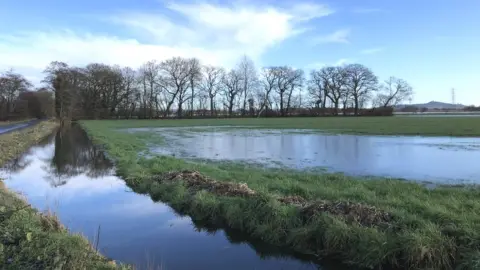 BBC
BBCEnvironmental campaigners have welcomed news that companies could be paid to stop the extraction of peat.
Somerset County Council and the government are discussing how to fund the move.
Sales of peat to amateur gardeners will be banned in England from next year but it can still be mined under licence.
Sian Russell, from Somerset Wildlife Trust, said "peat is an invaluable resource" and its extraction needs to "end as soon as possible".
The Somerset Levels have a 2,000-year history of peat excavation but before winning last year's county council election the Liberal Democrats pledged to end it.
The council wants to pay compensation to companies who volunteer to end the practice.
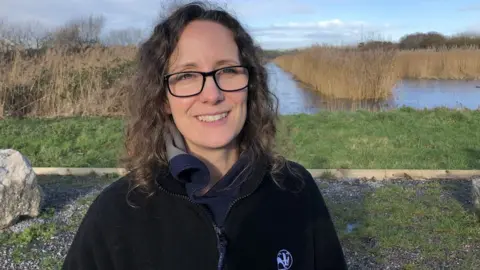 AFP
AFPThe wildlife trust said the Somerset Levels contain 60,000 hectares (231 sq miles) of peat land which stores almost 11 million tonnes of carbon. It is also a wildlife haven as the country's largest remaining wetland.
The soggy plants in peat take in carbon dioxide during photosynthesis but because they stay wet rather than fully decompose they hold onto that CO2. If the peat is dug up the stored carbon is released.
Mrs Russell said: "Peat extraction will always be a part of Somerset's history and has shaped the landscape around us today but undisturbed peat is an invaluable resource when it comes to both carbon storage and nature.
"Peat extraction that continues to take place is under licences which were issued decades ago."
"Every bucket of peat that's taken from the ground worsens the climate emergency as well as accelerating nature's decline, so ultimately we need peat extraction to end as soon as possible."
Peat-free future
A mile away from the wildlife trust's Westhay National Nature Reserve - a patchwork of bird hides and walkways crossing former peat works - is Godwins, which produces three million bags of compost a year.
They are still digging up small amounts of peat from the levels while looking to futureproof their business, investing in new equipment and offering peat-free compost.
Ben Malin, the sixth-generation managing director of the company, said they would eventually stop extracting peat.
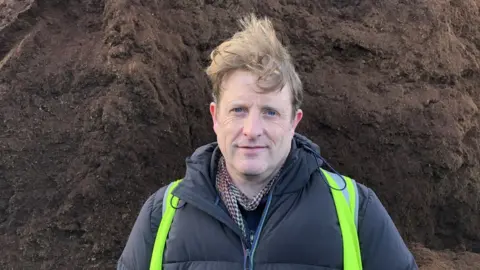
"Peat has traditionally been very, very important but we've worked really hard over the last 20-odd years to reduce the amount of peat we use," he said.
"We're now down to about 30% peat so it's less important than it was - so we're preparing for a peat-free future, in line with government legislation."
"We intend to be here in the long term as a business," added Mr Malin.
DEFRA's ban applies to peat in products designed for everyday gardeners, professional growers will initially be exempt but a ban is planned for that industry too.
Hestercombe gardens, near Taunton, are also moving towards a peat-free future - food waste from the kitchens and shredded paper from the office are mixed with garden waste to make their own compost.
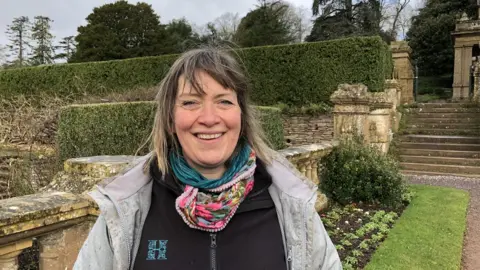
Head gardener Claire Greensdale said: "The only place we struggle really is the bedding plants on the Victorian terrace. They're grown for us by professionals who are reluctant to change and will probably end their careers as peat phases out."
She says plants can grow as well without peat being used.
"We used to grow stuff at home without peat, it's not been that long we've used peat at home, so definitely you can grow whatever you want in a good soil," she said.
No new licences
A Defra spokesperson said peat lands are not only an "iconic" part of the UK landscape, they are the UK's largest stores of carbon.
"They also supply over a quarter of the UK's drinking water, decrease flood risk and provide food and shelter for rare wildlife," they said.
"However, when peat is extracted or becomes degraded it can release carbon dioxide contributing to climate change."
The spokesperson said the government has stopped granting licences for peat extraction on new or existing sites.
"We are continuing to explore how best we can support Mineral Planning Authorities, such as Somerset County Council, when opportunities to voluntarily bring an end to extraction are identified," they said.
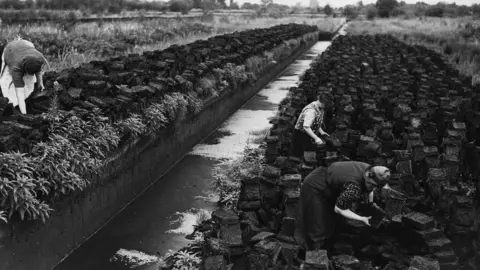 Getty Images
Getty ImagesA spokesperson for Somerset County Council said it was "keen" to work with operators who want to voluntarily end peat extraction.
"We don't have figures for extraction rates or amounts removed in recent years but the number of operational sites is certainly reducing," the spokesperson added.
"All licenses are due to expire by the end of 2042, however it is anticipated most, if not all, will be complete in advance of this."

Follow BBC West on Facebook, Twitter and Instagram. Send your story ideas to: [email protected]
